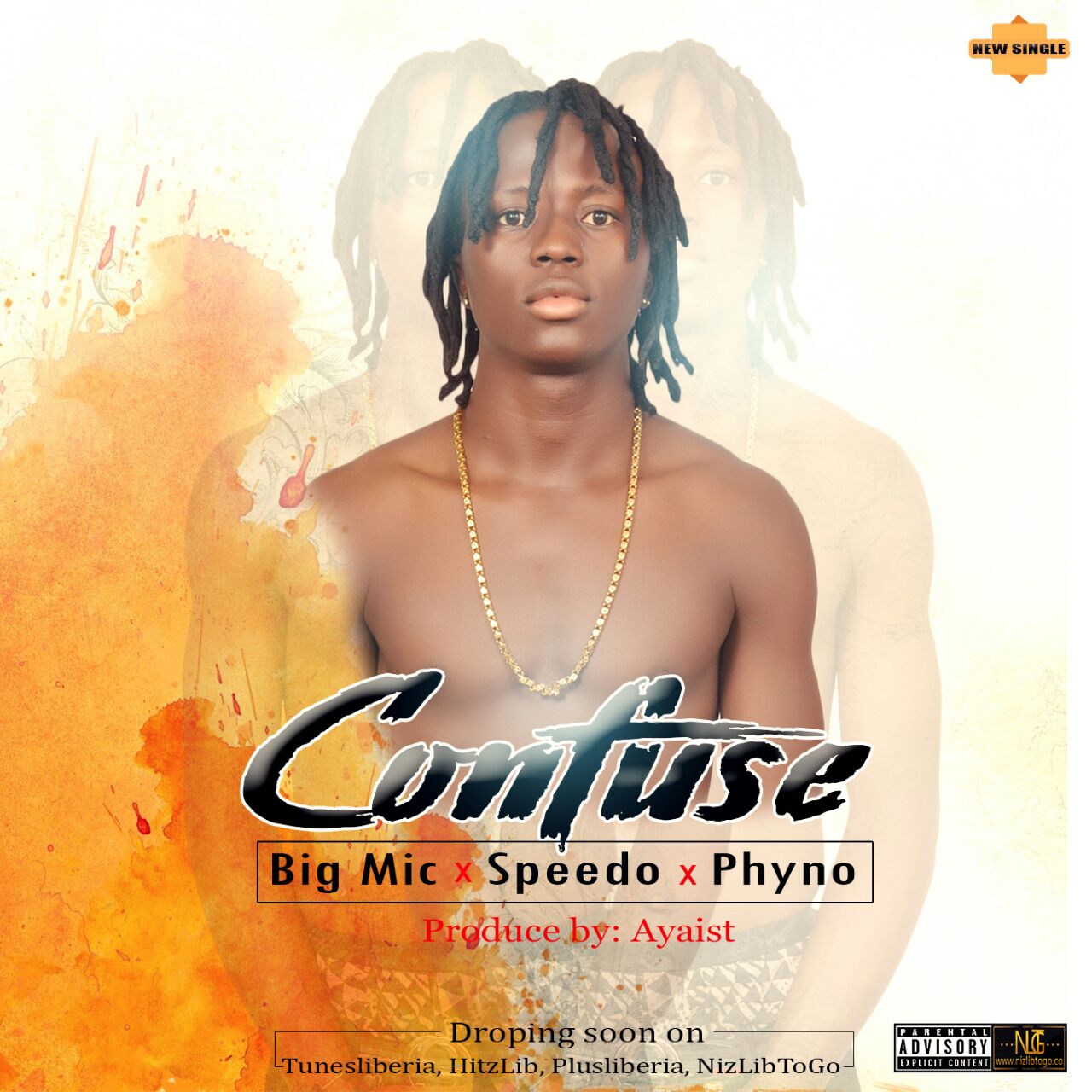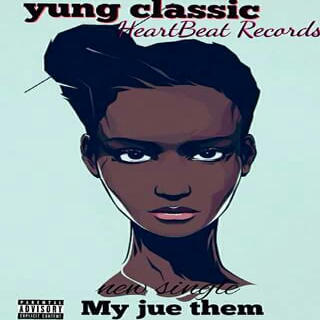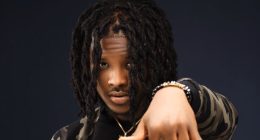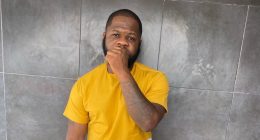Advertisement
By Gboko John Stewart (Online Blogger/Reporter)
Monrovia – As a child growing up in the United States and Liberia, Eugene Herring had a knack for music, but sometimes it came with many a spanking when he listened to songs not meant for his ears.“The love was always there. I even got beaten once or twice while listening to a few things I shouldn’t have been listening to as a child,” he says with crack smile.The rapper has been straddling between both worlds—Liberia and America—since birth.“My mother was in school on a government scholarship at Seton Hall University when the 1980 war [coup] broke out and having no real means by which to get home, she began to work and build a life in America,” he says in an exclusive interview with FrontPage Africa.
“I was born in Newark, New Jersey. At the age of 2, I was taken to Liberia. I spent time back and forth but continued my education in America with my older brothers.”
Known by the moniker Geno the Gawd, Eugene passion for music would land him a scholarship to boarding school for boys with a knack for music in Connecticut and later to Syracuse University to earn a degree in International Relations and by a strange twist of fate, finds himself as a policy wonk in the office of President Ellen Johnson Sirleaf.
But that still hasn’t stopped him from moonlighting – spending leisure time in the studio dropping hits after hits.
In an exclusive interview with FrontPage Africa, he lets it all out from whence it began.
So when did your love for the arts start?
Eugene Herring: I always had a love for music while growing up…from my older siblings playing it to my parents singing in the house…the love was always there. I even got beaten once or twice over listening to a few things which I shouldn’t have been listening to as a child.
Did it disappear when you went to college?
EH: It didn’t disappear as much as it wasn’t at the forefront. I’m working on a new music now with a producer that I went to school with at Syracuse.
I guess the time wasn’t right for me then – I was thinking about how to get good grades. That’s to say I never stopped writing and recording in college but it was for fun.
Give me an idyllic description of your childhood.
EH: My story is a bit funny finding myself in Liberia. My mother was in school on a government scholarship at Seton Hall University when the 1980 war [coup] broke out and having no real means by which to get home, she began to work and build a life in America. I was born in Newark, New Jersey.
At the age of 2, I was taken to Liberia. I spent time back and forth but continued my education in America with my older brothers. Being the youngest of the four siblings, I grew up fast and found myself accustomed to constant competition – we always wanted to know who the best was.
I grew up playing soccer and basketball, playing up to the high school level. I was too short to play basketball in college. I left home when I was 10 to attend the American Boychoir School, which was a boarding school for boys who had an interest in music. That was where I really began to hone my skills technically.
However, I was always a lover of hip-hop and so I was constantly trying to find a place where the technical classical training could meet the music I enjoyed.
I got a scholarship to go to a boarding school in Connecticut called Avon Old Farms and continued musical training while there, even leading/arranging for ac acapella assemble. But when I got to college, there was so much pressure to have academic success that I shied away from music until I met Bryan Natalio, aka the Bee, who began recording me.
Music was a lot of things for me. It has gotten me through tough times – filled a void when my mother and father got divorced. [It] kept my mind sharp when I needed to get away from books or whatever that was grabbing my attention. The childhood wasn’t perfect but it’s mine and I wouldn’t trade it in for any other experience.
My old ma was super supportive of my love of music, even though she hated hip hop. The last time I was in the States, I found a copy of notorious BIG’s Ready to Die Album in her car, so maybe there’s been a change of heart.
And what did you study in college? I read International Relations on your LinkedIn profile. From the dream of being a musician to veering to a career in diplomacy – how did that 360 degree happen?
EH: (laughter) Right, I studied International Relations. Growing up as a Liberian, you are bathed in politics no matter where you are – on the ground or in the diaspora. I always enjoyed it and at the time the music business was in disarray.
I wanted to be an A&R for a record company and one day own my own label. When I got to school I stuck close to two things I knew and enjoyed best – politics and music—an odd combination but that’s me.
So for me it wasn’t a 360. As much as it was, I was apprehensive to throw my eggs in one basket. And I should note at the time, the music industry its way in terms of the rising presence of the internet.
Companies were getting smaller and people were getting fired. I didn’t want to go to school, graduate and be begging amid the economic downturn America was going through.
What was the move after graduation? Were you at a crossroad of what to do now that you had gotten a degree and what to make the most out of it?
EH: Yeah…it’s funny – the same day I graduated, my old ma told me I couldn’t stay at the house and that my time there would be short-lived. So in haste, I found a job on the Hill, working for the House subcommittee on Africa and health under the guidance of the late Donald Payne who was a great friend to Liberia. We spent a lot of time talking about moving back home which I really wanted to do at an early age—at that time I think I was 21 or 22—it seemed like an impossible thing when he was suggesting it. Plus, I wanted to enjoy it.
So in between, you had a slew of jobs?
Well, from college straight to DC—I was on the Hill for two years and then I transitioned to an NGO called Africare. And while there, one of the board members kept urging me to go back to Liberia; and coming from a white man, I didn’t know whether to be happy or be insulted (laughter).
But he meant well. It was arranged for me to come and work out of Africare’s Liberia office and while there I met the President [Sirleaf] and Dr. McClain and the rest is history. I went back to DC and packed up all of my things and came to the mansion.
Coming back home to a place you shuttled between when you were little, what wave came over you when you hit the tarmac?
EH: It was a surreal feeling to wish for something and then have it come true; to know that you’re entering a different arena from a work standpoint; socially getting used to things…the familiarity of things is what helped me get through a rocky stage.
Moving can be tough. Moving to a different country can be tougher and then stepping into a situation where people depend on you, i.e. family, and understanding the way you are perceived.
Yeah it can be. But did you think about your artistic exploits in your move back home or you busied yourself immediately when you started work? What was the defining wake up moment which brought your alter ego to life? I guess no one in Liberia knew you were an artiste—most probably thought you were that policy wonk.
EH: I flew to Liberia on a Sunday and reported to work Monday at 7:00 a.m. I was immediately busy with policy, long hours. Plus, I needed to take time to learn the systems and figure myself out as I relate to Monrovia. “Geno” came to life during Ebola season (that’s what I like to call it).
Advertisement
Did you take an immediate notice of the musical terrain when you came home?
EH: Of course, immediately. The first some I really took to when I got here was Human Beings by Lil Bishop—still one of my favorite records. I think things slowed down a bit and I was looking to keep my mind sharp and occupied a bit.
Also, there was no music other than Ebola related songs coming out. So that year I decided I would record some sort of music so that I could listen to what I wanted to hear. And so I began writing in my down time. Then I was quarantined so I had PLENTY time to think.
At what point did you know it was time to show Liberia what you were made of?
EH: It wasn’t so much that I made a conscious decision but when Baddie came out, people really took to it. Teddy Ride, who is featured on the song, kept tell me “Proh ley pepo wan see you o” and that’s how it started coming together. I think my first big show was the Monrovia Liquor Show at ATS when they unveiled the beast.
what was the first track you released?
Is there a reason for that song?
EH: To be honest, not really. I recorded it at Liberty Ent. Studio and it was the first one I finished. And when people heard it, they went with it. Funny—that day we recorded that song was the first time I met Vino (the producer) and Teddy Ride.
Venny Beatz?
EH: Venny Beatz da different man o (laughter).
FPA: Oh ok. Your moniker – why Geno the Gawd? Is it this aura of superiority?
EH: Geno was a nickname I got in college and I added Gawd because my God made me in his likeness and image, thus making me Gawd (me and the papay can’t carry the exact same name na). but it works well in giving off an air of superiority which, as a musician—especially a rapper—is necessary.
Your new song Gba is working the charts since its release. There was this fever pitch prior to its release—tell us about the uniqueness of that song because I remember you kept your fans on the edge for weeks.
EH: Yeah, I think the anticipation was beautiful—it’s always good to build up on that. Gba is a song I wrote in Accra for a visit—I met up with Franky G of 3FS Production, which at the time was producing Irene Logan and he sent me some beats—I like the edge of this one and its uniqueness—I felt like it was fresh for the Liberian ears and I wanted to bring some new sound, so I got straight to work on it.
The song centered on that same swag and bravado we were talking about before when discussing an air of superiority and the utmost belief that you are the best. The song opens—Gba , I here to take over Gba, been patient j I think the wait is over Gba—welcome to the era of the Gawd.
FPA: You, like many artistes around the world, remixed Panda and gosh, it sounded so good. What’s amazing about it is you were able to mix tongue swagging American English with the raucous Liberian pidgin.
EH: Honestly, that mixture is becoming the cornerstone of my sound—I’ve often tried to find a balance in terms of colloquial and standard English. Panda was a monster song and so I went to record my verses and met Cypha in the studio that day working on the same instrumental and the rest is history—I’m grateful to have begun the Panda hysteria in Liberia.
The music industry appears to be thriving, however at a snail pace. What do the artistes need to do to make it better? I have heard most people say that government but in reality they aren’t because, you know, the industry is more of a private sector initiative. Yes, the government can help by luring investors but the musicians have to top their game and make quality songs. If we looked back and compare where we are now, there’s progress in the tune and beat but still, how can we catch up with countries like Ghana and Nigeria?
EH: I think there’s a few things—as musicians, we have to become students of what came before us in order to see where we are going. Music is the science of continual innovation—we have to take the little technical pieces and really learn them. The government can’t help you write a great song. Also equally if not more important, the Liberians that do have money don’t want to invest in the arts.
I’m assuming because there’s no clear way to ensure return on investment, but artistes need someone to take a chance on them. If we are to catch the Nigerias, South Africas, Kenyas, Ghanas in terms of growing the industry, we need to respect our craft and our artistes—pay to get their music, pay to see them—those are the only ways our country music will get better in terms of sound, marketing etc. All of it requires money.
Rome wasn’t built in the day so the progress will be slow. But we can see the music getting better every day…everyday there’s a new song coming out. The radio needs to give those records a chance to spin—you make superstars by allowing the public to constantly consume—so there’s need to be majority Liberian music on the radio.
You’ve travelled and see how limited airplay is for foreign music in a country like Ghana—we just need to take pride in our own as we make waves in other people’s arena.
Liberia is mourning the death of Quincy B. I know as an artiste you may have worked with him a couple of times but during those moments, what did you discover of him? What will you miss him more about?
EH: Absolutely—he was actually one of the first artistes that I wanted to work with—I remember the first time walking into the studio on Camp Johnson Road and I remember his demeanor, his humility, his ease in instructing other artistes and his genuine love for what he was doing.
The last time I saw him, we watched the final edit for the song he was doing with Sweetz. Aside from sharing the limelight, for me it was the intellectual moments—trading ideas, looking at the future—he’ll be sorely missed man. He leaves a big gap. I held a song just for a year for him to be on it but he never got on it, that’s how much respect there was. Great kid, man.
Aye Gba, what last thing you want to add and what can your fans expect in the years ahead?
EH: My music is my passion—I love it and share it with everyone. This year I have a few things ahead—I’ll be finishing the album which is untitled but will feature music that until now Liberians have not considered making.
I’m constantly pushing my boundaries artistically. I’ll be doing free shows—working out details with sponsors and finally, I’ll have merchandise that will be for sale and I will be doing free giveaways to students. Let’s expand ourselves—more life, more love.
It’s been a pleasure.
EH: It’s been a long time coming. Thanks for such a thoughtful bunch of questions.
Report by Gboko Stewart, [email protected] of Frontpage Africa









